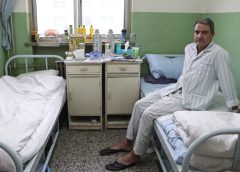
“[Those] Who say, when afflicted with calamity: “To Allah We belong, and to Him is our return.” (Baqara, 2:156)
Man easily gets sick. It is really unbearable. You have headache all the time; lose your appetite; cannot get any taste from foods. Time, which normally flows like a river, almost stops. That is, life loses its beauty for the sick.
It takes some time to get better. Apart from the medical process of recovery, there is the behavioural process of the sickness. That is, some of us show patience, but some of us lose patience and complain. Our attitude is important for us as Muslims. We know that every behaviour in this life will have a result in the hereafter. Unaware of this fact many Muslims actually miss great opportunities during their sickness.
“The times of calamity are long, the times of happiness, most short.” This life is really really short. Man is like traveller who just stops by a tree takes a few minutes rest and then continue his journey. No matter how much we try to do our best to perform our worship to Allah SWT, the worldly affairs (even if it is related to the services for Muslim community) prevents us to focus
on our servanthood to our Creator. We cannot think about our personal deeds for our hereafter. Sickness is actually a great opportunity for a Muslim to have some inner account of his life, to repent from his sins, to evaluate his past, and to correct his wrongs. In a way the time lengthens and slows down for the sick Muslim and gives him a break to check his life. He can better understand the meaning of his life and the value of his being Muslim. He can even start to get the benefits of the moments of being sick and starts to worship his Lord in a sincere manner.
Illness is an important and true warner which never deceives us. This life is not eternal. Man has come to the world to work for the hereafter. If there had never been sicknesses, we would forget the death. Sickness reminds us that we are not immortal, that we are not here to live for worldly pleasures. Therefore, we even should be thankful for the illnesses that they guide us to our real duties.
At this age illness is a Divine bounty for some people. The youth, for instance, think much more about their religion when they get ill. Their heedlessness, drunkenness, and some desires are gone thanks to the illnesses. However, other young people mostly spend their time in sins. The superficial pleasures they have in this life actually destroy their hereafter; but they are unaware of it. Therefore, the illness becomes a bounty for the youth by preventing them from sins and heedlessness, and it brings them an eternal happiness in the hereafter.
“Things are known through their opposites.” If there was no darkness, we would not know the light and its pleasure. If there was no cold, we would not know the warmth. If there was no hunger, we would not appreciate the pleasure of the food. Likewise, if it was not for the illness, we would not realize the bounty of good health. The illnesses make us to understand the value of the good health and to thank Allah SWT. We might even spend an entire life in heedlessness if there was no sickness.
“As ripe fruits fall from their tree being shaken, so the sins of a believer fall away on his shaking with illness.” (Kenzul Ummal, v.3, p.316) Illness is like a soap. It cleans all the dirt. If we have patience while we are sick, our past sins are forgiven inshaallah.
As Muslims we should not complain about sicknesses, we must be patient patients.
“[It is He] Who gives me food and drink, and when I am ill, it is He Who cures me.” (Shu’ara, 26:79, 80)


“[It is He] Who gives me food and drink, and when I am ill, it is He Who cures me.” (Shu’ara, 26:79, 80)
Is it not he who makes us ill for any reasons that he knows?
I am asking myself some questions because i have this sudent high fever during the last 10 days of Ramadan and i do not know how to interpret it, any suggestion?
As salamu alaikum,
Fabien.